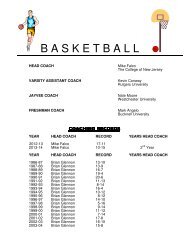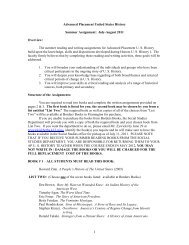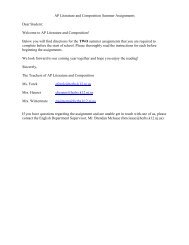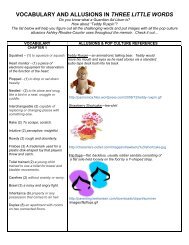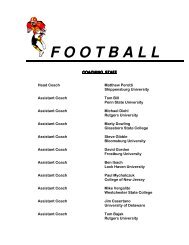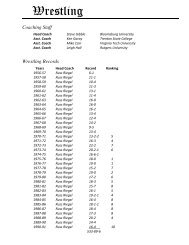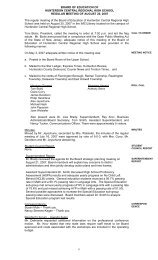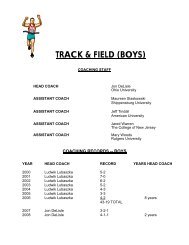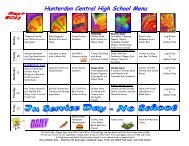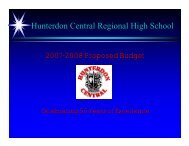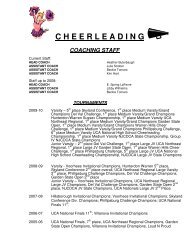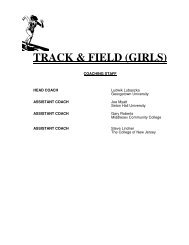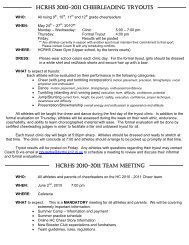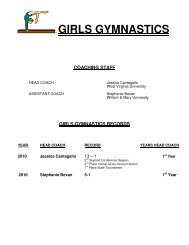Program of Studies - Hunterdon Central Regional High School
Program of Studies - Hunterdon Central Regional High School
Program of Studies - Hunterdon Central Regional High School
Create successful ePaper yourself
Turn your PDF publications into a flip-book with our unique Google optimized e-Paper software.
#138 - HUMAN RIGHTS AND GENOCIDE AFTER WORLD WAR II – 2.5 CREDITS<br />
Grades: 11-12<br />
(SOC 138 HUM RIGHTS/GENOC)<br />
Prerequisite: #034 Honors Humanities 3, #128 CWS 2 or #130 CWS 2 Basic Skills<br />
Human Rights violations and genocides did not end with the perpetrators <strong>of</strong> the Holocaust being brought to justice at the post<br />
World War II Nuremberg and Tokyo tribunals. This course builds on the introduction to human rights and global security<br />
issues studied in #128 Comparative World <strong>Studies</strong> 2, as well as the 20 th century genocides examined in both U.S. 2 and the<br />
Holocaust and Human Behavior. The course addresses essential questions about the contemporary protection <strong>of</strong> international<br />
human rights and the continuing problem <strong>of</strong> genocide in the world community. Among these are:<br />
1. Why do massive human rights violations and genocides persist?<br />
2. How did the international community resolve the crises that were created in the aftermath <strong>of</strong> WWII?<br />
3. How did the Nuremberg and Tokyo tribunals shape future legal proceedings?<br />
4. How are perpetrators brought to justice?<br />
5. How can genocide be stopped or prevented?<br />
6. What has been done to rebuild societies that have been decimated by massive human rights violations?<br />
Students taking the course will examine in depth the role <strong>of</strong> the UN and other international organizations, as well as<br />
actions <strong>of</strong> varied world states, studying a wide range <strong>of</strong> sources including historic documents, literature, films, and<br />
survivor testimonies. A comprehensive social action project dealing with prevention <strong>of</strong> human rights violations and<br />
genocide will be incorporated to help students develop a personal understanding <strong>of</strong> the continuing problems <strong>of</strong><br />
genocide and human rights violations in today’s world.<br />
#139 – HONORS INTRO TO WESTERN PHILOSOPHY - 2.5 CREDITS<br />
Grades: 11-12<br />
(SOC 139 HON W PHILOSOPHY)<br />
Prerequisite: None<br />
This course is a general overview <strong>of</strong> philosophical traditions beginning with ancient times and continuing to the present. The<br />
purpose <strong>of</strong> this course is to acquaint students with the study <strong>of</strong> philosophy and its basic questions, which are relevant to all<br />
disciplines. A concentrated reading schedule structured around central questions such as, “What can we know?” “What is<br />
right?” and “Why am I here?” will allow students to analyze the writings <strong>of</strong> major philosophers and their answers to these<br />
questions as well as helping students begin to answer these questions for themselves. The course ought to be challenging to<br />
students <strong>of</strong> high academic ability. Philosophy is a course valuable to students planning to major in the humanities, and it<br />
provides opportunities to develop critical skills helpful for students entering the fields <strong>of</strong> law and medicine. This course is<br />
available for college credit in the FDU Middle College <strong>Program</strong>.<br />
#141 - AFRICAN STUDIES - 2.5 CREDITS (SOC 141 AFRICAN STUDIES)<br />
Grades: 10-12<br />
Prerequisite: None<br />
African <strong>Studies</strong> explores the rich diversity <strong>of</strong> sub-Saharan African cultures in a contemporary setting. The course provides a<br />
comprehensive and accurate description <strong>of</strong> modern Africa, emphasizing the political, economic, geographical, cultural and<br />
social developments currently underway on the continent. Topics include: colonialism, the Atlantic Slave Trade, family<br />
structures, gender issues, music, politics, urbanization and village life, education, healthcare, environmental concerns, and<br />
human rights issues. Students are expected to read course materials, be active participants in class discussions, complete oral<br />
and written projects, and utilize technology applications to complete class investigations and projects. As the Kiswahili proverb<br />
suggests, "Hapa umefika" which translates, "This is the place you are looking for." Karibuni (welcome)!<br />
79



